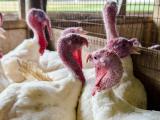Apr 30, 2010
FDA ramps up safety rules for food transport
The Food and Drug Administration (FDA) announced today in the Federal Register that it will strengthen rules to protect food from contamination while it is being transported. The rules, which follow the 2005 Sanitary Food Transportation Act, cover shippers and receivers and both road and rail transport. They address food temperatures in transport, monitoring for pests, standards for transport vehicles and pallets, and best practices for loading and unloading. The rules announced today are temporary but will be the legal standard until final regulations called for by the 2005 act are written and enacted.
Apr 30 FDA advance notice of proposed rulemaking
Apr 30 FDA press release
High-dose flu vaccine for elderly coming this year
A new high-dose influenza vaccine for elderly people, Fluzone High-Dose, will be available for the 2010-11 flu season in the United States, the Centers for Disease Control and Prevention (CDC) notes in today's issue of Morbidity and Mortality Weekly Report. The vaccine, made by Sanofi Pasteur and approved in December, contains four times as much antigen as standard flu vaccines—60 micrograms of each of the three viruses covered. While the vaccine may be used by people 65 years and older, the CDC's Advisory Committee on Immunization Practices has not stated a preference for any specific flu vaccine for this age-group, the CDC said. The committee is waiting for data to show whether the high-dose vaccine provides greater protection in the elderly, who don't respond as strongly to vaccines as younger people do. A postlicensure study of the effectiveness of Fluzone High-Dose is scheduled to be completed in 2012, the CDC said. As previously reported, the vaccine induced significantly stronger immune responses than a standard vaccine in a large phase 3 clinical trial.
Apr 30 MMWR article
Dec 28, 2009, CIDRAP story on high-dose vaccine
Adjuvanted H5N1 vaccine looks good in early clinical trial
An H5N1 avian influenza vaccine made by GlaxoSmithKline and containing a proprietary oil-in-water adjuvant was safe and immunogenic at levels that would pass European and American licensure, researchers reported in the June issue of the Journal of Infectious Diseases. In a phase 1/2 study that included 680 adults, volunteers received two doses, spaced 21 days apart, containing 3.75 micrograms of antigen without adjuvant or with either 11.86 mg or 5.93 mg of the tocopherol-based adjuvant. They used a prepandemic vaccine candidate against an Indonesian H5N1 clade that was produced at two different manufacturing sites. The adjuvanted formulations were more immunogenic and induced cross-reactive immunity against three other H5N1 clades and subclades. Short-term injection-site pain was reported by 80% of those who received the adjuvanted vaccine; no other safety or immunogenicity concerns were noted at 6-month follow up. The study was funded by the Biomedical Advanced Research and Development Authority of the US Department of Health and Human Services and sponsored by Glaxo.
Jun 1 J Infect Dis abstract
More than 6,000 birds killed in Vietnam's latest H5N1 outbreaks
The latest spate of H5N1 avian flu outbreaks in Vietnam led to the death of more than 6,000 domestic birds through illness and culling, according to a report the government filed with the World Organization of Animal Health (OIE). The outbreaks in Quang Ninh, Quang Ngai, and Quang Tri provinces involved 1,350 cases and 850 deaths in flocks totaling 6,070 birds, the report said. The figures signaled an apparent mortality rate of 14% in the flocks and an apparent case-fatality rate of about 63%. After the outbreaks were detected, remaining healthy birds in the flocks were destroyed. Likely causes listed for the outbreaks include introduction of new animals, illegal movement of animals, and fomites such as humans, vehicles, and feed.
Apr 29 OIE report



















